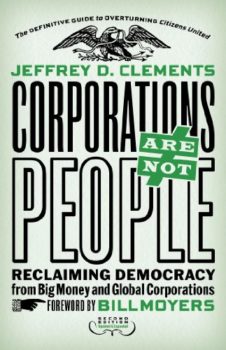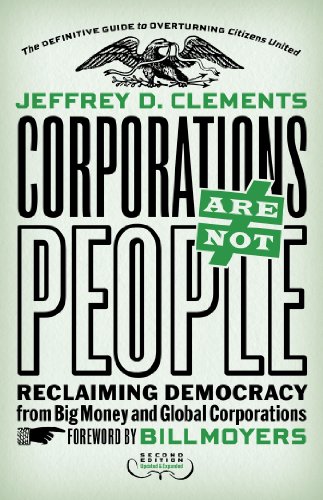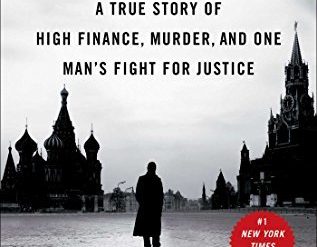
If you’re like most Americans, you may think that the Supreme Court’s decision in Citizens United v. Federal Election Commission is the root cause of the stranglehold on U.S. elections by major corporations and the 1%.
If you follow public affairs more closely than most, you’re aware that the situation is more complicated than this — that the misbegotten principle of “corporate personhood” that underpins Citizens United is a major element in the picture. I knew that much before I read Jeffrey Clements’ eye-opening book, Corporations Are Not People – but I didn’t have a clue where that concept came from, how it grew into one of the dominant judicial doctrines of the last several decades, or the truly pivotal role it has played in recent American history.
In fact, Citizens United was only one of the latest episodes in a four-decade-long history of legal, political, and social change that has moved the center of gravity in public discourse in America so far to the right that our last two Democratic Presidents can only be seen in global context as moderate conservatives, while today’s Republican leaders hold such extreme views that to term them “conservative” is a gross misuse of the language.
Corporations Are Not People: Why They Have More Rights Than You Do and What You Can Do About It by Jeffrey D. Clements ★★★★★
As Jeffrey Clements tells it, the story begins in 1970 with the first Earth Day. The mobilization of more than 20 million Americans in that masterful organizing effort led to the passage of a long series of laws that established the basis for long-overdue environmental regulation: the creation of the Environmental Protection Agency, the Occupational Health and Safety Act that created OSHA, the Clean Air Act, and a host of others.
Then the corporate world struck back.
A soft-spoken Southern attorney named Lewis F. Powell, Jr. led the charge. Powell was defending Philip Morris in the growing wave of lawsuits about cigarette smoking in the 1960s and sat on its board. Shortly before accepting his appointment to the Supreme Court by Richard Nixon in 1971, Powell wrote a now-infamous memo to a friend at the U. S. Chamber of Commerce, the bastion of corporate America. The “Powell Memo” kicked off the four-decade assault by the corporate elite and the 1% that stifles American democracy today.
Under the title “Attack on American Free Enterprise System,” Powell explained, “‘No thoughtful person can question that the American economic system is under broad attack.’ In response, corporations must organize and fund a drive to achieve political power through ‘united action.’” As a lawyer, Powell naturally saw the courts as the centerpiece of the pro-corporate strategy he advocated. “Activist judges” on courts throughout the land, and especially on the U. S. Supreme Court, would roll back legislation such as the flood of new environmental laws.
The corporate campaign rolled out in the years after Powell’s memo in spheres of activity: lobbying Congress, state legislatures, and the public through industry front groups such as the Tobacco Institute and the Edison Electric Institute; electing or appointing pro-corporate judges such as Powell himself; and influencing public education and shaping public opinion through a flotilla of Right-Wing think tanks including the Heritage Foundation, the Cato Institute, the Manhattan Institute, and many others.
Since Powell’s memo circulated in the upper echelons of corporate America in 1971, corporations, primarily the large transnational companies that dominate the Chamber of Commerce, have poured billions of dollars into these activities. However, until his death in 1998, Lewis Powell continued to lead the pro-corporate effort from his seat on the U. S. Supreme Court. In the early and mid-1970s, Powell was thwarted by Chief Justice William Rehnquist, but the tide turned in 1978 when Powell prevailed over strenuous objections from the Chief in a case that firmly established the “right” of corporations to flaunt laws passed to keep them in check by establishing the principle of corporate personhood.
Corporations Are Not People is an activist plea for readers to join the gathering movement to overturn Citizens United, wrest political power from the corporations, and put it back in the hands of people. As Jeffrey Clements sees it, there are “three essential steps to roll back corporate dominance of government: (1) a twenty-eighth amendment to the Constitution that will overturn Citizens United and corporate rights and restore people’s rights; (2) corporate accountability and charter reform to ensure that corporations better reflect the public policy reasons for which we allow the legal benefits of incorporation, such as limited liability, in the first place; and (3) election law reform, including increased public funding, greater transparency, and an end to legal political bribery.”
As an advocate for public funding of elections since 1972 and a long-time participant in electoral politics at every level – local, regional, statewide, and national – I find Clements’ three steps to be right on target. The structural reforms he proposes would strike at the heart of the forces that are strangling our political rights and advancing the interests of the 1% against those of the 99%.
Much of Corporations Are Not People is devoted to the many resources offered readers at the back of the book: the wording of the proposed 28th Amendment; a draft resolution favoring passage of the amendment that organizations and local governmental bodies may adopt; and contact information for the growing list of organizations that are coming together in the new movement to roll back corporate power.
Jeffrey D. Clements is an attorney in Concord, Massachusetts. A former Assistant Attorney General of his state, he cofounded Free Speech for People following the ruling in Citizens United.
For further reading
Like to read books about politics and current affairs? Check out Top 10 nonfiction books about politics (plus dozens of runners-up).
If you enjoy reading nonfiction in general, you might also enjoy:
- Science explained in 10 excellent popular books
- Great biographies I’ve reviewed: my 10 favorites
- Top 10 nonfiction books about politics
And you can always find my most popular reviews, and the most recent ones, plus a guide to this whole site, on the Home Page.


























